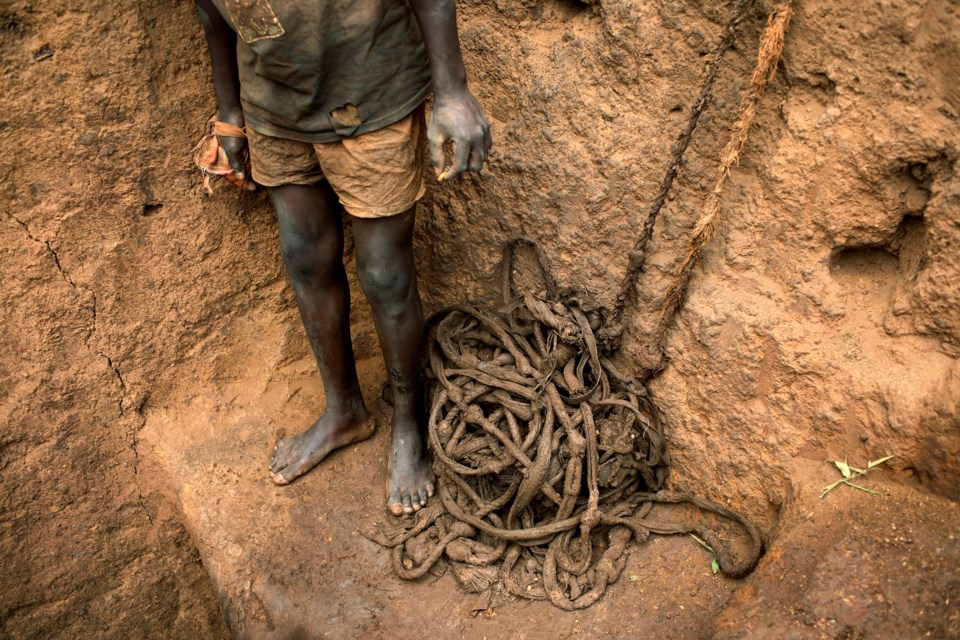If there’s a hell, it’s a teenage mother with a sick child strapped to her back, breaking rocks and putting them into a sack while she and her baby breathe in toxic dust. If she’s lucky, she’ll make a dollar or two and they will buy something to eat. They will both be dead in less than a year.
This is not a dystopian fantasy. This is the reality for an artisan cobalt miner in the Democratic Republic of the Congo (DRC). She is the one who gathers the minerals needed so you can recharge your smartphone, your laptop, your headphones, and your shiny electric vehicle. Though manufacturers will tell us that they source their cobalt only from ethical mines, that is a myth. The DRC has by far the richest mines in the world, and they are linked to the supply lines bringing the materials needed to make our batteries.
I thought I had seen the worst of human suffering when I lived in the DRC in the early 1990s. At that time, the region now producing cobalt was known for its copper production. The riches from these largely industrial mines lined the pockets of the American puppet dictator, Joseph Mobutu Sese Seko, while his people lived in squalor. In their dark humour, Congolese spoke of a nonexistent law called “Article 15: Débrouillez-vous”, which meant “figure it out; find a way to get by”. Ironically, that is the way of life in the DRC. I never saw people work harder, and it is that spirit that foreign corporations continue to exploit.
In the aftermath of the Rwandan Genocide, Mobutu lost control of his country and was overthrown by Laurent Kabila. When he was assassinated, his son Joseph took over. Warlords gained control of the eastern region of the Congo, exploiting tantalum, gold, and other minerals needed in our computers and cell phones. Millions have died in the carnage fueled by these conflict minerals, and foreign mining companies have profitably exploited the situation.
Misery expanded southward as the demand for cobalt, a byproduct of copper mining, became essential to modern technology. Joseph Kabila made deals with Chinese, Swiss, Canadian, and other foreign mining corporations and enriched himself the way Mobutu had.
Mobutu and the Kabilas modeled their economies after that of King Leopold II of Belgium and his Congo Free State. In 1890, Joseph Conrad traveled by steamship up the Congo River and later recounted his experience in the book Heart of Darkness. His words describing the exploitation of the Congolese continue to disturb our collective conscience: “The horror! The horror!”
Félix Tshisekedi, the first democratically elected president of the DRC since 1960, has done little to bring foreign mining corporations under control. Today, millions of Congolese men, boys, women, and girls dig cobalt from the ground, break stones, wash them in contaminated water, put them in raffia sacks, and carry them out of the mines. They often end up seriously injured or dead when walls of earth collapse onto them. The children cannot afford to go to school, the water is undrinkable, and the once-fertile soil is poisoned. Foreign nationals living in walled-off compounds see this happening as they send their wealth overseas.
Life for the Congolese will not change until consumers demand proof that there is only clean cobalt in their electric vehicles and other technology. We are seeing history repeat itself. The spirit of King Leopold lives on in foreign mining, automobile, and technology corporations.
Much credit for our awareness of the cobalt crimes in the Congo has to go to Siddharth Kara for his groundbreaking book Cobalt Red. He has been speaking on every possible platform, from Joe Rogan to Democracy Now since his account was published in January. Now we just need to listen.
Cobalt is not blue, and green energy is not green. They are both the colour of Congolese blood.
Gerry Chidiac is a Prince George writer.




